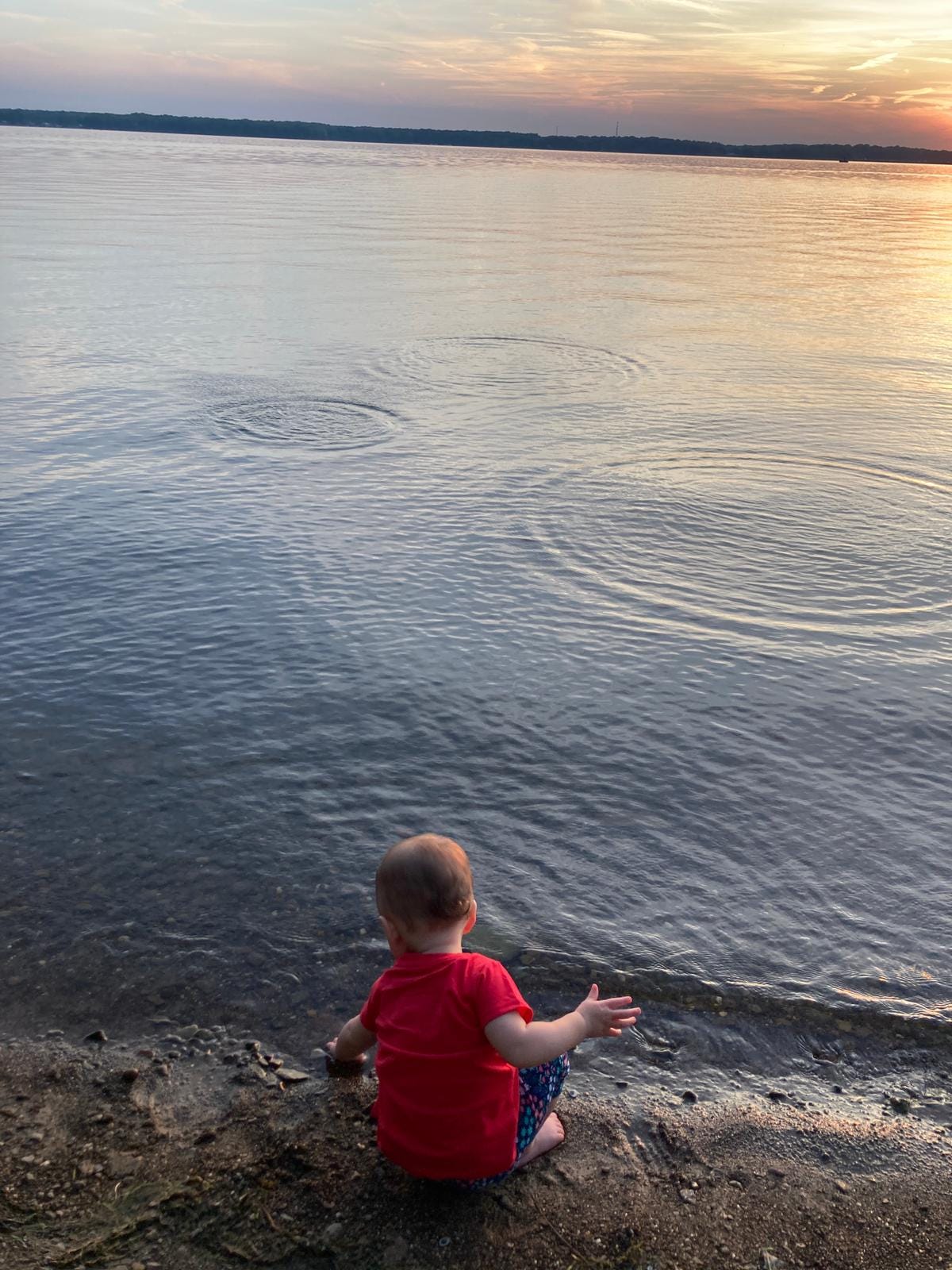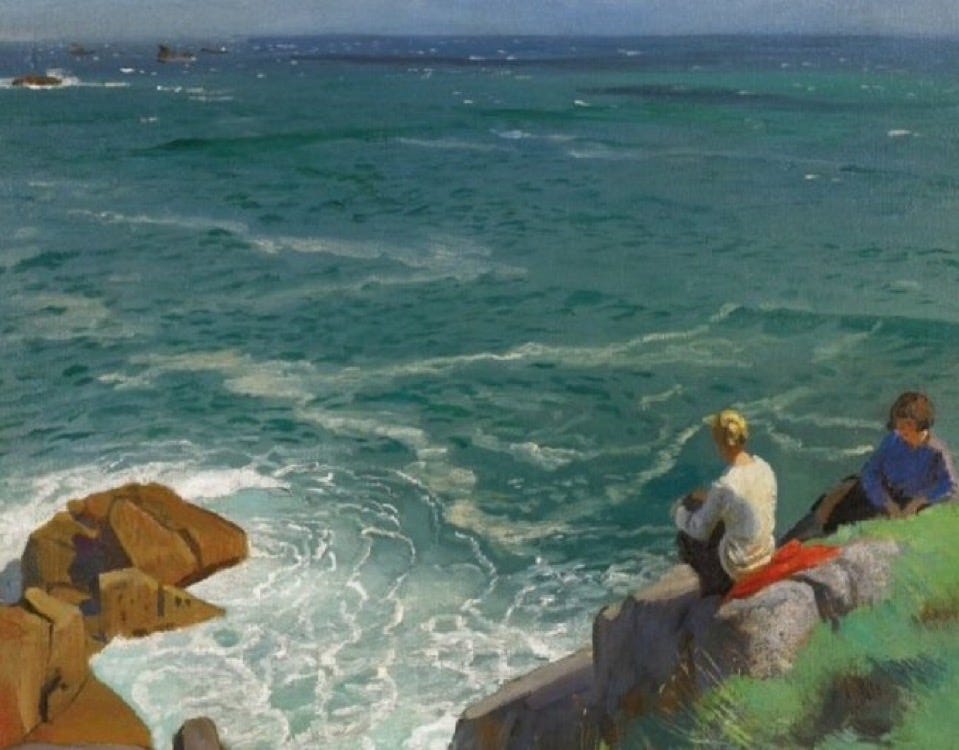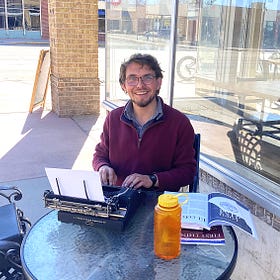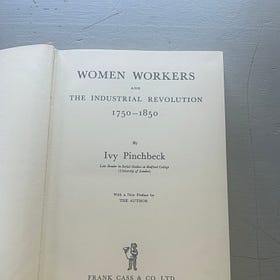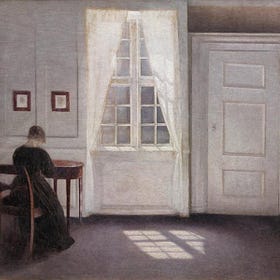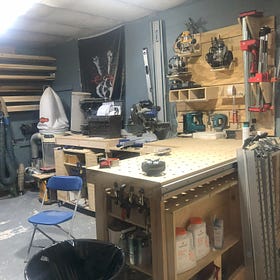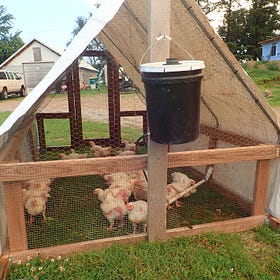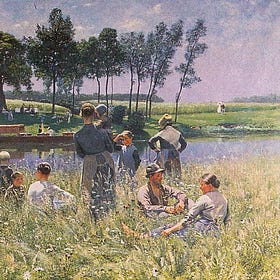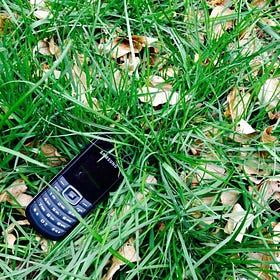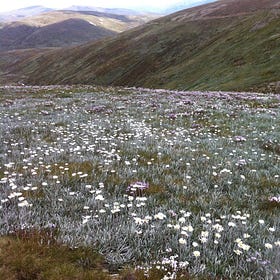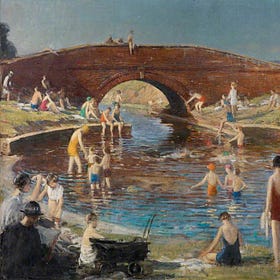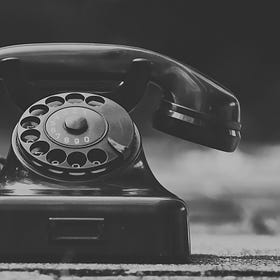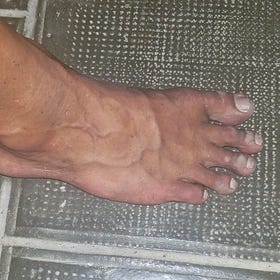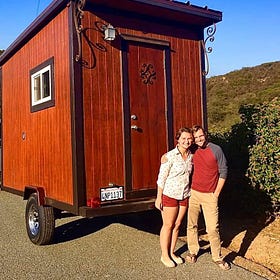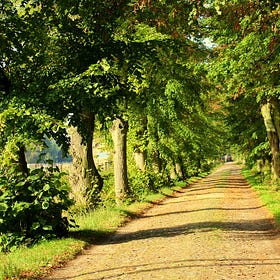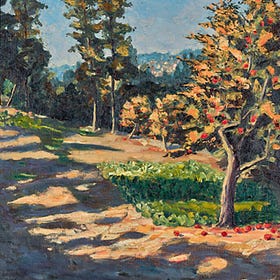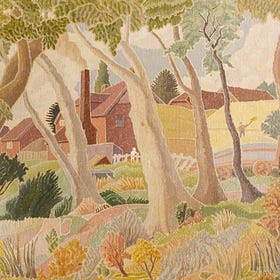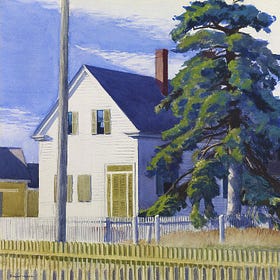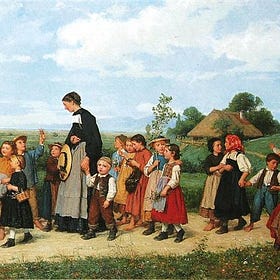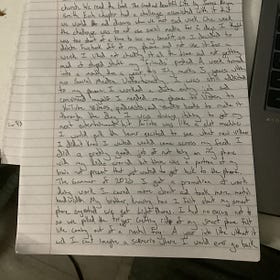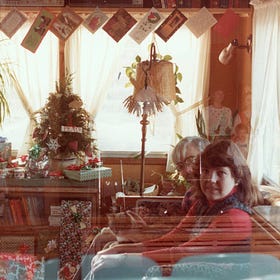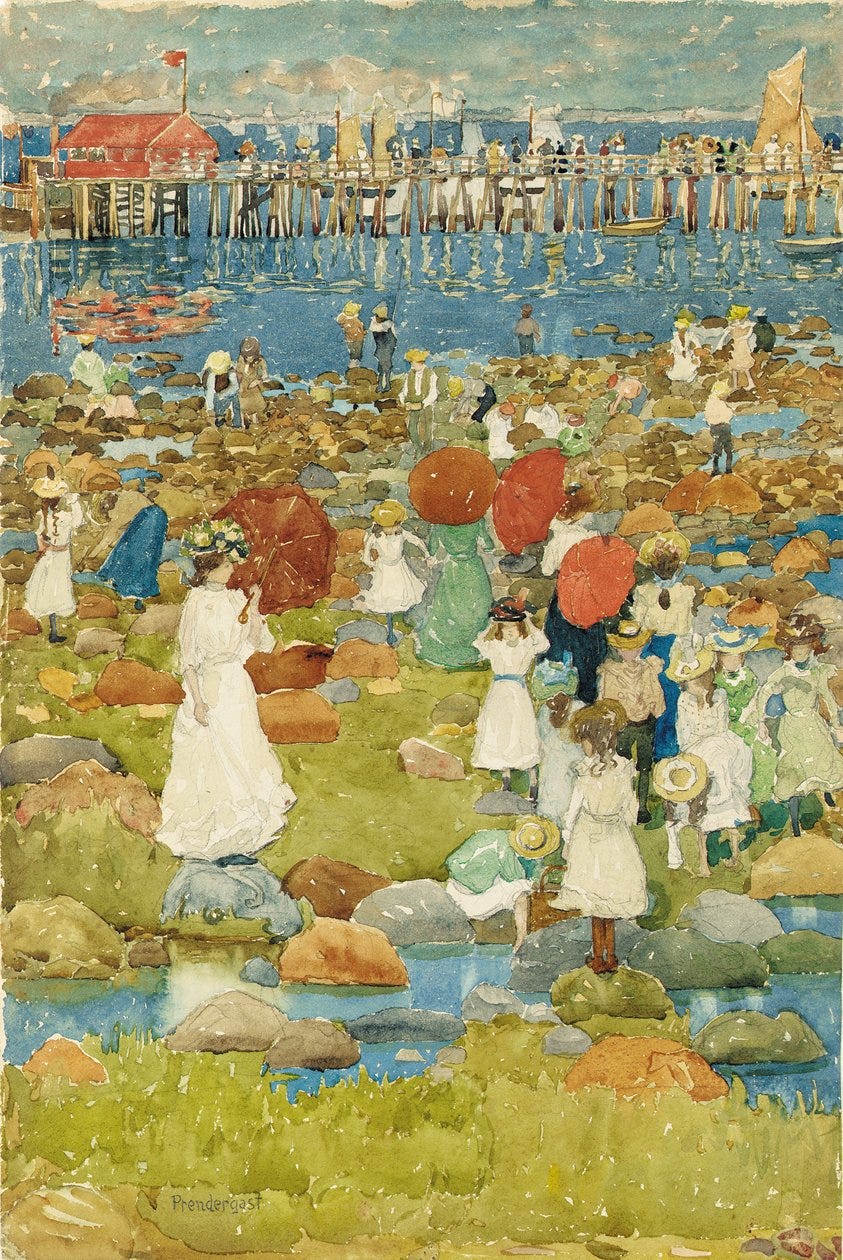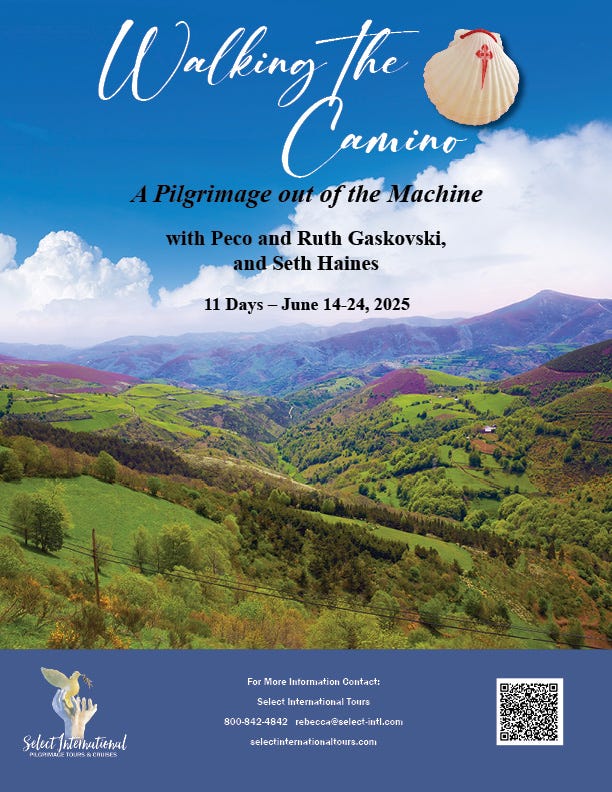A Library of Unconformed Lives
Readers share their stories of living unconformed lives in a digital age
When the whole world is running towards a cliff, he who is running in the opposite direction appears to have lost his mind.
- C.S. Lewis
Nasa engineer, NGO worker, nurse, editor, extrovert, goat herder, graphic designer, gardener, father, film maker, financial advisor, farmer, mother, mechanic, manager, missionary, psychologist, plumber, priest, investor, introvert, teenager, boomer, octogenarian — this rich mosaic of people is a small sample of the readers of School of the Unconformed. There are few current concerns where people who differ so greatly in their personal lives and worldviews unite on common ground.
The movement of people seeking to unmachine their lives is growing and spans across the political, professional, religious, and age spectrum. And it affirms that people are ready to resist the trend toward the ever greater incursion of digital technology in our daily lives.
and I have been writing on navigating life in the digital age for more than a year here on School of the Unconformed. Throughout our interactions with our readership we repeatedly noted that in addition to evidence and practical advice, people are in search of inspiring personal stories that model a different relationship with technology.Over the course of history it was not just facts, nor research, nor evidence alone that prompted social change. It was people. Especially those who inspired others with their vision and their stories.
At the beginning of July, we invited our readers to share their stories of “living unconformed lives in a digital age”. Today we are excited to present a tremendous collection ranging from well-crafted stories and articles to reflective journal entries and letters.
In today’s post we first feature one full-length story by
, which addresses the unique challenge of Gen Zs who have grown up “in the jungle of the internet” yet are now seeking to reclaim reality. Next, we present an overview of the nearly forty other entries, which have something for everyone: relates his unconformity in matters technology, work, finance, sustenance, and more; offers guidance on creating a letter writing habit; and reflect on spiritual dimensions; practices digital distraction dissent via knitting; goes barefoot; rejects hookup culture1; Maeve Reilly questions time; , , , , and many more share insights and practices from analog life.You can click on the entries to read the full stories, which will remain freely accessible in our new Library of Unconformed Lives2 section. If you would like to share a comment, please do so on this main post here3.
Please note: As this was not a "contest" but rather a collection, there are no "winners", and posts are not listed according to any ranking.
The entries include a wide variety of approaches and opinions, which do not necessarily reflect our own, but rather the views of individual authors.
Before you dive into the stories, a couple of brief announcements:
If you are interested in “Unconformed Education”, I (Ruth) will be hosting a live zoom meeting this Sunday, August 25th at 2 PM EST. Homeschool historian
will be joining in as well! See here for details.If you would like to have a unique experience of “opting into life”, come and join
and me along with on A Pilgrimage out of the Machine! You can read all about it here or view the brochure here.It has been a tremendous pleasure to read through these entries and prepare them for this post. Community projects like these do however take an immense amount of time and effort. If you would like us to organize similar projects in future, please consider supporting our work with a paid subscription. Thank you :)
Your Stories of Living Unconformed Lives
Leaving Social Media
Shared reality, learning from babies, making friends, and what Instagram can't see
by
fromFirst, I must acknowledge the irony of posting this essay on Substack: If you leave one social media platform and don’t post about it on another social media platform, did it even happen? Anyway, jokes aside, I hope you enjoy this week’s Story from Scribbleland. If you get anything from it, please do subscribe and share with a like-minded friend.
Growing Up in The Jungle of The Internet
I entered into a new kind of place, a place unbound by tradition or shared social mores. I walked, in my yellow sundress and high-heeled sandals, into a jungle.
I was 14 years old when I underwent Gen Z’s unofficial coming-of-age ceremony: logging onto social media. Facebook was first. Instagram followed.
Although my entry into social media echoed the Edwardian debutante’s “coming out,” this modern version couldn’t be less alike. I didn’t enter formally into a ballroom of familiar faces to dance the waltzes I had practiced since girlhood. Instead, I entered into a new kind of place, a place unbound by tradition or shared social mores. I walked, in my yellow sundress and high-heeled sandals, into a jungle.
At first, it wasn’t bad. The platform had not yet been flooded with influencers and ads. My feed contained my friends’ posts, and that was about it. No stories, no reels, no Kardashians. Mostly just pixelated, B&W selfies of insecure middle-schoolers and their dogs. We would chat back and forth in the comments sections, oblivious to any outside observers (especially our parents).
But the unstable digital environment soon began to change.
By 2016, everyone was on Instagram (even our parents). It began to impact social customs in real life. After I met someone new, my first instinct was to scroll the grid of their Instagram profile with a practiced eye. After five minutes perusal, I could sort them into one of two piles: cool or uncool.
The criteria shifted constantly.
While members of Edwardian British society felt pressure to stay fashionable, their clothing styles changed slowly on an annual basis, and their social mores remained stable.
In the last decade, American mainstream fashion has gone from skinny jeans and plaid to cargo pants and crop tops. As Günseli Yalcinkaya observes in an essay for Dazed, “The world is splintering.” Even the term “mainstream” has little meaning today, drowned in a flood of insulated and constantly shifting subcultures.
As for social mores—those are jumbled too. Young women, schooled by feminism, have expectations of young men that often go uncommunicated. Young men, stymied, turn to Reddit and join internet movements like the Red Pill. Both groups attempt to impose draconian social rules artificially on a social scene that has none, and, in the process, end up more confused and divided than before.
The term “shared reality” was coined by two psychologists, Hardins and Higgins, in a 1996 paper to describe how people establish “a sense of both social connection and understanding the world.”
In an era of my dreams and my truth, we enjoy individualism’s freedom of self-determination. But at what cost? We’re losing collectivism’s stability, our sense of shared reality.
With unstable norms for how to dress, believe, and behave, the pressure mounts to spend inordinate amounts of time and energy on “keeping up.” Today, what that “keeping up” requires, in practical terms, is lots and lots of screentime.
As I navigated my teens, I grew used to living, at least partially, on social media. Even on days when I didn’t open the app, I judged myself by its metrics. My mind formed into the shape of a square frame, a camera’s viewfinder. Captions scrolled through it.
I was anxious. I was fashionable. I was playing the status game. For a long time, though, I didn’t see this as a problem.
Setting My Priorities Helped Me Define Tech Boundaries
In the jungle of the internet, I was shoved to and fro amid the vast horde of competing companies, influencers, and apps. In college, I sensed I was losing control, and I wanted out. The fall of my sophomore, I drove a car over my iPhone in a fit of Luddite rage.
But after only a few months with a flip phone, I bought a cheap Moto smartphone and reverted. I needed Google Maps for a summer in Germany, and with it, reintroduced all the distracting apps I had determined to shun.
This pattern continued. My iPhone and I would break up, get back together, break up, get back together. I didn’t know how to balance my desire for modern conveniences with my desire to escape compulsive scrolling and internet surfing.
One commonly-cited effect of pornography is how it reduces men’s drive to pursue sexual relationships in real life. Once I exited college, social media began to stunt my social life in a similar way. It offered ersatz interactions just appealing enough to keep me complacent. I didn’t have to go through the slog of trying to make friends in a new place if I could post a pic at my own convenience and get a stream of hearts in return. Not only was I missing out on “shared reality” online—being online was making me miss out in real life.
It’s easiest to follow the path of least resistance. But when I became a mom last year, I looked at the squirming, bright-eyed baby on my lap and decided I no longer wanted to.
It wasn’t my protective instincts that drove my exodus from Instagram. I wasn’t worried my child would become an “iPad kid,” her brain rotted by a constant diet of YouTube. At least at this stage of development, such harms were not yet possible. Infants, with their lack of object permanence, are limited by nature to the present moment—touch, taste, see, smell.
I left social media because I wanted a closer relationship with my baby. Because, being a baby, she had “opted out” of technology by default, if I wanted to be with her, I would have to join her.
“Unless you become like a child…”—Jesus’ words from Matthew 18 echoed in my mind—“Unless you become like a child, you cannot enter the kingdom of heaven.”
My baby, at less than 1 year old, was already teaching me by example.
With this newfound clarity, I targeted the specific apps and features of my phone that prevented me from staying present. Instead of throwing out my iPhone, I used its Screentime feature to identify timesucks. If I caught myself aimlessly staring at screens, I changed the display to grayscale.
Now, I could keep Google Maps without buying into Instagram, Facebook, and X. It just required a strong “why” and some intentionality.
At 24, a decade after creating my social media accounts, I deleted them.
What Instagram Can’t See
Since leaving social media, my life has been, in most respects, perfectly ordinary. Perhaps I’m more emotionally stable. I certainly waste less time. If Instagram’s influence was subtle, being off Instagram is similarly difficult to quantify. But there’s a new grace that shines in my interactions with people.
Now that I’ve left social media, I don’t know whether my acquaintances are good at self-marketing, whether they know how to pose in photos or construct an on-trend persona. I don’t get to believe they are my friends because I saw their wedding photos in my feed.
Instead, the people I meet are black boxes, mysterious and unpredictable. The only way to remove that mystery is to gradually unfurl to one another over a long process of walks, tea times, and conversations.
Together, in real time, I must do the hard work of co-creating a shared reality.
Comfort in someone’s company, long silences—in essence, real relationships—that’s what I’ve desired all my life. That’s what I’m striving for now. And those are exactly the things that Instagram can’t see.
By from
Essentially we want love and communion with others; we want knowledge that builds us up; we want to care for and create good things, from children to pencil sketches, from chicken runs to governments. Each of these things requires tools and technologies, and will enable us to strive for our ends in various ways. To aim at our ends in a fully human way, what we need is intentional agency over our lives, to the extent that that is possible. In saying this I am not proposing that we be “control freaks.” When God created man, he tasked him with a certain amount of control: “Till the earth and keep it.”
There are many ways to “till” our lives and our environment. Some are better than others. That question of what “better” means is the technology question. Here’s what I’ve found “better” to mean in my life.
By Maeve Reilly
Irish Time
What time is it? Who cares? I’m several miles from town, up a steep mountain road, I’ve no car, no mobile phone. The Week-At-A-Glance I brought with me from my old life has seven blank days this week, next week, every week. My only ‘appointment’, on Sunday at eleven, doesn’t need to be entered. Maud rings me Saturday nights and asks if I’ll be going to church and would I like a lift. My answer is always yes, and yes.
By from
I often fantasize about going completely ‘off-line’ and entirely removing phone and internet from the property. In our eight years on our homestead, we’ve ‘cut the cord’ twice – once when I dropped a wall on our phone & internet cable during a building demo, and the other time when a relative followed my directions when digging a trench and chewed through our cable.
By from
I was making a blanket for the baby I was blessed with, and who was the motivation for my sobriety. That baby would have a mother who knit her Halloween costumes and britches to cover her cloth diapered bottom, not a strung out IV drug addict who couldn’t manage reality.
By from
We are drowning in electronic communication--much of it is meaningless, and very little of it is of lasting value. None of it is tangible. I write letters because they embody all of the best aspects of communication. Letters are meaningful, intimate, private, tangible, and worth holding on to.
By from
Analog life feels good to me. It feels straightforward, simple. And I’m not anti-technology. I like my iPhone, and I wrote just the other day about my love for automatic soap dispensers. I just prefer a life that’s mostly grounded in the physical, tangible world.
By from
I write on unlined paper in all capital letters with pens selected for their smooth flowing ink and fine point. I imagine instead having made those hundreds of lists on my iphone while my little ones watch me. They are always watching.
By from
I ask the group chat for something it can’t give me when I check it instead of interacting with the people nearby.
I ask YouTube for something it can’t give me when I watch sketch after sketch, staving off sadness that must, at some point, be felt.
I ask my email inbox for something it can’t give me when I refresh, and refresh, waiting for evidence that I’m a real writer now.
By from
The phone is off, the camera battery dead, but in this moment, I feel very much alive.
By from
I had not realized the great emptiness I had been living in for so long.
I had wasted my life focusing on human-made things rather than Creator-created Creation. And the human-made world did not evoke the satisfying wonder I was just now beginning to grasp.
By from
I haven’t always been an aspiring luddite. Indeed, for many years I was a dogged defender of digital technology, touting its benefits and blaming its users for any ill effects that they themselves experienced… But as the years have flown by, I’ve come to see more clearly many of the destructive effects of digital technology, and I have felt a growing impetous to rout such technologies from our lives. I do not want to live my life chained to a screen, nor do I want that for my loved ones.
By from
The dumbphone experiment was a tiny first step, a toe dip into the water. But it set a number of things in motion. I kept asking the question about any technology that I used, anything in the modern digital world that sometimes stole my focus, attention or peace of mind. Below, I'd like to outline some of changes I've made…
By from
This idea of death by comfort has been a motivator for me. It helps me to tackle a difficult book, look up words I don’t know or am not sure of, memorise scripture, get up and move around, practice my guitar, or write a long letter instead of sending a quick email. These are small things but they are diffusive acts that seep into other areas of our lives.
By from thelovelyroad
It can be hard to resist the siren call of our iPhone and the lure of digital media. My mobile device usually goes with me everywhere I go, sometimes to my consternation, and I admit I still have Gmail on my phone right alongside the Substack icon. I do enjoy using the Calm app which helps me with my almost daily meditation sessions.
Although I feel I've made progress on lessening the amount of time I spend on my phone and obviously there is room for improvement, there are still things that my brain stubbornly refuses to utilize my phone for.
By from
Living unconfromed lives in the digital age is an increasingly difficult enterprise. Every single day we are under pressure from external forces and bombarded with seductive stimuli the purpose of which is to shape us into something resembling less of an individual and more of a cog in the grand machine that is modern culture.
By Peter Severson
"Incursions amid the siege against my attention"
By Stephen Jackson
By from
We use tools to accomplish goals, but we use toys just to entertain ourselves, with no extrinsic value or product other than the enjoyment. Every tool that a smartphone replaces can be un-replaced with a simpler alternative, but that incessant desire for entertainment can't be replaced so easily.
By from
The feet themselves grow to become like bricks of muscle, built to feast upon the earth, upon earthen paths, pavement, parking lots, rocks, whatever. My feet became conquerers. In retrospect its sometimes humorous to see ripped men in gyms who look like they could lift cars yet whose feet are so weak they couldn´t endure a 5km walk in the park without injury. Few parables could sum up our contemporary world so succinctly. We have become incomparably strong in many aspects of life, but with consideration of the most essential point of contact with the ground, or at the metaphorical level with reality itself, we have become altogether limpid and almost ill-equiped to endure the slightest discomfort or confrontation without technological mediation or assistance.
By from
They were domestic vagabonds of a sort that first year, putting together a home and family memories in their own way, in a very tiny space. Neither one asked for much more than to be with the other as the adventure unfolded day by day. It was strangely freeing to me to watch two people so unfettered from "stuff" and the conventional expectations of the world at large.
By
Despite trying various digital detox strategies, I would inevitably get sucked back into the endless loop of content as soon as I watched a single video. The cycle was exhausting, both mentally and physically.
I realized that the key wasn’t just about eliminating technology altogether but rather finding a way to use it more intentionally.
By
In our modern world we can achieve so many things with so little effort. We can manipulate our world with more success than Merlin ever dreamed of. Our technology can also dazzle us in ways that paintings, sculptures, cathedrals, and the genuinely numinous used to. So what happens when Christianity, a relic of an old world long forgot, becomes less awful (by which I mean the old sense of the word as in awe-full) than our machine world?
By L.
We have in the last week moved into a township where most essentials ( like supermarket, library etc..) are within walking distance. I am very exciting to continue this one car experiment and try experience our little town on foot. I want to take the time to learn who my neighbours are and learn the names of the streets and take the time to really know the place in which I am living. I am finding that is easier to do at a walking pace.
By from
I first realized that my phone was starting to become a problem in my motherhood when my 2-year-old son said “Mommy, phone off!” These were devastating words to hear, especially since I tried so hard to balance his screentime, only to find out it was my screentime that was the bigger problem.
By from
As I shift to a more effortful way of wondering, I also notice my own attention shifting to the question of attention itself; I find myself pondering what it means to seek knowledge and demonstrate love by giving my full attention (or at least as much of it as I can spare at any given time). I find myself relishing answers and how they're found, but I also find myself loving the questions themselves. And that, in a distractible and digital age, is a precious and unexpected gift.
By from
A few weeks into our 30 day screen detox, things were going so well I did something I had never done before: I wrote an email to the author thanking her for writing her book. Through that, she connected me with Melanie Hempe, founder of Screen Strong. Melanie’s story is one of pain and struggle met with determination, hope and victory. I am proud to serve as an Ambassador for this organization as we work to build strong families and say no to toxic screen use (smartphones, social media, pornography and video games).
By Amy Nolan
I quit social media at that time and have never looked back. I then came across “1,000 Hours Outside” which is a phenomenal movement aimed at getting people to have more green time than screen time. It’s quite the revelation to start tracking how much time you truly spend outside and spoiler alert—it’s not as much as you think!
By from
By Anne Marie
By T. Johnson
"I realized just how different I was"
By
My family runs a free after-school program for low-income students that attend the elementary school next door. We have 30ish students come over every day to the ministry building next to our house.
Besides using a tv to sing songs, the kids aren’t allowed to use electronics and spend 2-3.5 hours a day reading, baking, gardening, doing art and LEGO, memorizing verses, talking, and playing with our volunteers and us. We also take them out to hike local trails once a week during the warmer months.
By Paul H.
One week the challenge was to not use Social Media for 2 days. I thought that was too short of a time to see any benefit, so I decided to delete Facebook off of my phone and not use it for a week. I liked not checking it all the time and not getting mad at stupid stuff (much of it political) my “friends” posted. A week turned into a month, then a year, this July marks 5 years with no Social Media!
By Lynda
By from
I live so much in and through my mind as a reader and writer; I build things digitally, connect with many of my friends online; I am still, in all seriousness though partly as a joke, a bobblehead who lives a step or two detached from reality. At least, reality so demanding and immediate as watching something you own burst into flames when you don’t exactly want it to cease existing as it was.
That exquisite realization (with the consequent emotions and thoughts) of such tactile destruction is something I experience so rarely, perhaps too rarely for my mind to maintain a healthy grasp of what is here and the now.
By A.T.
Stories & Plants
By
By Patti
Another teacher said, “Well this is their world and they need to navigate it and resist.” I was devastated – how can a ten-year-old resist the computer games that the world’s best engineers have designed specifically for engagement and addiction?
I told Julie not to play games or jump off tests or assignments to do other things on the computer, but the teachers would say, “When you are finished do whatever you like.” The class is full of other children who are playing games, watching videos, and listening to music, my requests were viewed as odd, not with-it, and not the new way that things are done.
By Cindy Anderson
Entering the Garden
If you found this post helpful (or hopeful), please consider supporting our work by becoming a paid subscriber. Thank you :)
Please share this post with family, friends, community groups, or anyone else who you think might be interested in inspiring others to live unconformed lives in a digital age!
Do you have a story that you would like to add to the “Library of Unconformed Lives”? Keep it under 2000 words and send it to schooloftheunconformed@proton.me.
Which of the stories particualry resonated with you? Why?
Please share your experiences, reflections, and questions in the comments section!
If you would like to have a unique experience of “opting into life”, come and join us on A Pilgrimage out of the Machine!
My husband Peco and I will be leading an eleven-day pilgrimage on the Camino trail in Spain next year, from June 14-24, 2025. Joining us, as co-leader, will be writer/photographer Seth Haines from The Examine. Space is limited so reserve your spot now :) You can read all about it here or view the brochure here. This trip is open to everyone, irrespective of religion or background.
We would love to walk together with you!
Do you have a story that you would like to add to the “Library of Unconformed Lives”? Keep it under 2000 words and send it to schooloftheunconformed@proton.me.
The "comments" for the posts in the library will be turned off, but readers will be directed to leave comments in this main post. Otherwise I would be left to manage the responses to almost 40 posts simultaneously, and that would simply make anyone's head spin!








